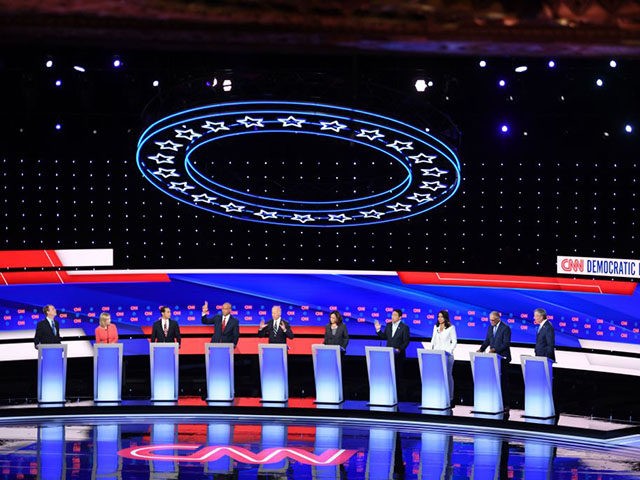The Democratic National Committee (DNC) on Monday intensified its qualification standards for November’s Democrat debate, which is expected to narrow the field of eligible participants even further.
The DNC is raising both the fundraising threshold as well as the polling standards, making it even more difficult for presidential hopefuls to lay out their vision on the national debate stage in November. In order to qualify, a candidate will have to report at least 165,000 individual donors, up from 130,000. The DNC is also requiring 600 unique donors in at least 20 states.
Candidates will have two ways to qualify for the debate via polling, either receiving five percent support in two early primary and caucus state polls – which includes Iowa, New Hampshire, Nevada, and South Carolina – or receiving three percent support in four early primary and caucus state polls or national polls.
While details of the November date are to be determined, any polls released “between Sept. 13 and midnight seven days before the debate” will count, the New York Times added, noting that “at least eight candidates have already met the 165,000-donor threshold.”
Candidates have until October 1 to qualify for next month’s debate at Otterbein University in Westerville, Ohio. In order to qualify, a candidate must garner at least two percent in four DNC-approved polls and report 130,000 individual donors, up from the 65,000 required for the first debate. Eleven candidates have qualified, including Tom Steyer (D). He will be joined by:
- Joe Biden (D)
- Sen. Cory Booker (D-NJ)
- Julián Castro (D)
- Sen. Kamala Harris (D-CA)
- Sen. Amy Klobuchar (D-MN)
- Beto O’Rourke (D)
- Sen. Bernie Sanders (I-VT)
- Sen. Elizabeth Warren (D-MA)
- Mayor Pete Buttigieg (D)
- Andrew Yang (D)
Both Marianne Williamson (D) and Rep. Tulsi Gabbard (D-HI) are still vying to get on the October debate stage, needing three polls and two polls, respectively.
The increased threshold is likely to draw critiques from low-tier candidates, who slammed the DNC’s requirements in the past.
“Here’s the situation: there’s a whole bunch of different polls that have come out. The DNC has only recognized some of them as being qualifying polls for the debate,” Gabbard told Tucker Carlson in August.
“The whole thing gets a little bit confusing. You’ve gotta jump way down into the weeds of the numbers and statistics, but I think the bigger problem is that whole process really lacks transparency,” she added.
“The DNC’s process is stifling debate at a time when we need it most,” Sen. Michael Bennet (D-CO) declared last month. “And it will NOT help us beat Donald Trump. If we wanted to be the party that excluded people, we’d be Republicans”:
The DNC's process is stifling debate at a time when we need it most. And it will NOT help us beat Donald Trump.
If we wanted to be the party that excluded people, we'd be Republicans. pic.twitter.com/EqsHvnoQ5h
— Michael Bennet (@MichaelBennet) August 23, 2019
“If the DNC had followed the process they announced in February and kept to the promised 17 [sic] qualifying polls, the lineup of the upcoming third debate might be very different,” Williamson’s communications director Patricia Ewing said prior to the third Democrat debate in Houston, Texas.

COMMENTS
Please let us know if you're having issues with commenting.